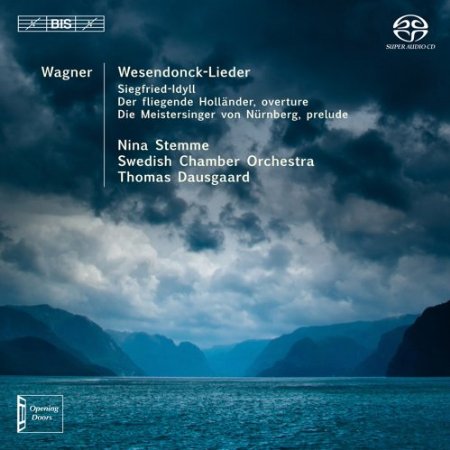
A Wagner Antidote
By Sebastian Spreng, Visual Artist and Classical Music Writer
A new CD comes in the middle of the tsunami occasioned by Richard Wagner’s 200th birthday. It could be warmly suggested as an antidote for Wagnerian novices and connoisseurs. For the first group provides an ideal, effortless introduction to the composer’s universe. For the second brings together an interesting group of works mostly linked to his private life. Fortunately for both, the vocals are performed by the foremost Wagnerian soprano of our day, Nina Stemme.
Since its inception in 1995, the Swedish Chamber Orchestra has aroused as much admiration as its musical director, Thomas Dausgaard. A great conductor of Nielsen, Bruckner and Schumann, the talented Dane invites us to sail on a cruise á la Wagner that, leaving the Baltic behind, puts in at impossible ports – Zurich, Lucerne, Nuremberg – related to the composer’s life and work.
The journey is marked by the tempestuous overture to The Flying Dutchman in its original (1841) and final (1860) versions. The latter includes the redemption by love was composed after Wagner’s transfiguration of Isolde in Tristan. With vehemence, Dausgaard conveys the fury of the stormy sea journey, which Wagner describes in the opera inspired by his voyage (actually, escape) from Riga to London. The waters turned calmer in the prelude to The Mastersingers of Nurenberg, his only comedy, one that that exemplifies his dualities and the clash between tradition and innovation via an astonishing contrapuntal treatment worthy of Bach.
A sophisticate French lady once said, “the Wesendonck Lieder captures Wagner’s essence; the rest is just mental inflammation.” She has her point. Using five poems by Mathilde Wesendonck, his unattainable beloved, Wagner condensed his whole creative energy into 20 minutes. The pain, passion and the ecstasy he experienced also opened the door into another dimension. Behind, he left a phase of his musical career, the barricades and Minna, his first wife. Ahead was the conclusion of the Ring cycle, Die Meistersinger, Parsifal and Cosima’s unconditional Hausfrau efficiency. In this creative hiatus we find Mathilde. The excuse is her poetry and the direct consequence is the paradigmatic Tristan und Isolde.
In Felix Mottl’s orchestral arrangement (and Träume in Wagner’s own arrangement), not all the illustrious Wagnerian singers have been convincing. In addition to the vocal power of Brünnhilde and Isolde, the Wesendonck songs requires a unique delicacy and sensitivity that do not always accompany “big” voices. Nina Stemme successfully combines both qualities. Hers is a performance that exudes controlled passion. Her immense voice reveals a dark and velvety veneer, an anguish close to the rough – in the best sense – texture of a rich mezzosoprano combined with that of a dramatic soprano able to take on heroic Wagnerian roles and – why not? – Bellini’s Norma. This Swedish singer’s admirable performance is among the best along with the recent renditions – as different as indispensable – by her compatriot Anne Sofie von Otter and by tenor Jonas Kaufmann.
Wagner’s Träume transcription for violin and orchestra provides an intimate and luminous final arrival to port. Also appropriate is the inclusion of the beautiful Siegfried Idyll, the closest thing to Happy Birthday the composer ever wrote. More than a celebration of his wife Cosima’s thirty-third birthday and the birth of their son Siegfried, it is, like everything in Wagner’s oeuvre, a paean to himself.
Wagner offers unforeseen pleasures. He does not have to be an acquired taste; he is an inevitable progression for the audience. It’s much easier to dismiss him, than to yield to his spell. For the composer, an embryonic Buddhist, his real bad karma was having been used by an individual born six years after his death. Someone about whom more has been written than about Wagner. They shared vegetarianism, love of dogs and hatred of practically the entire human race. One is better left unnamed. Luckily for us, we have Wagner’s music. Its greatness redeems him.
Recent Content
-
Artsarticle ·
-
Artsarticle ·
-
Artsarticle ·
